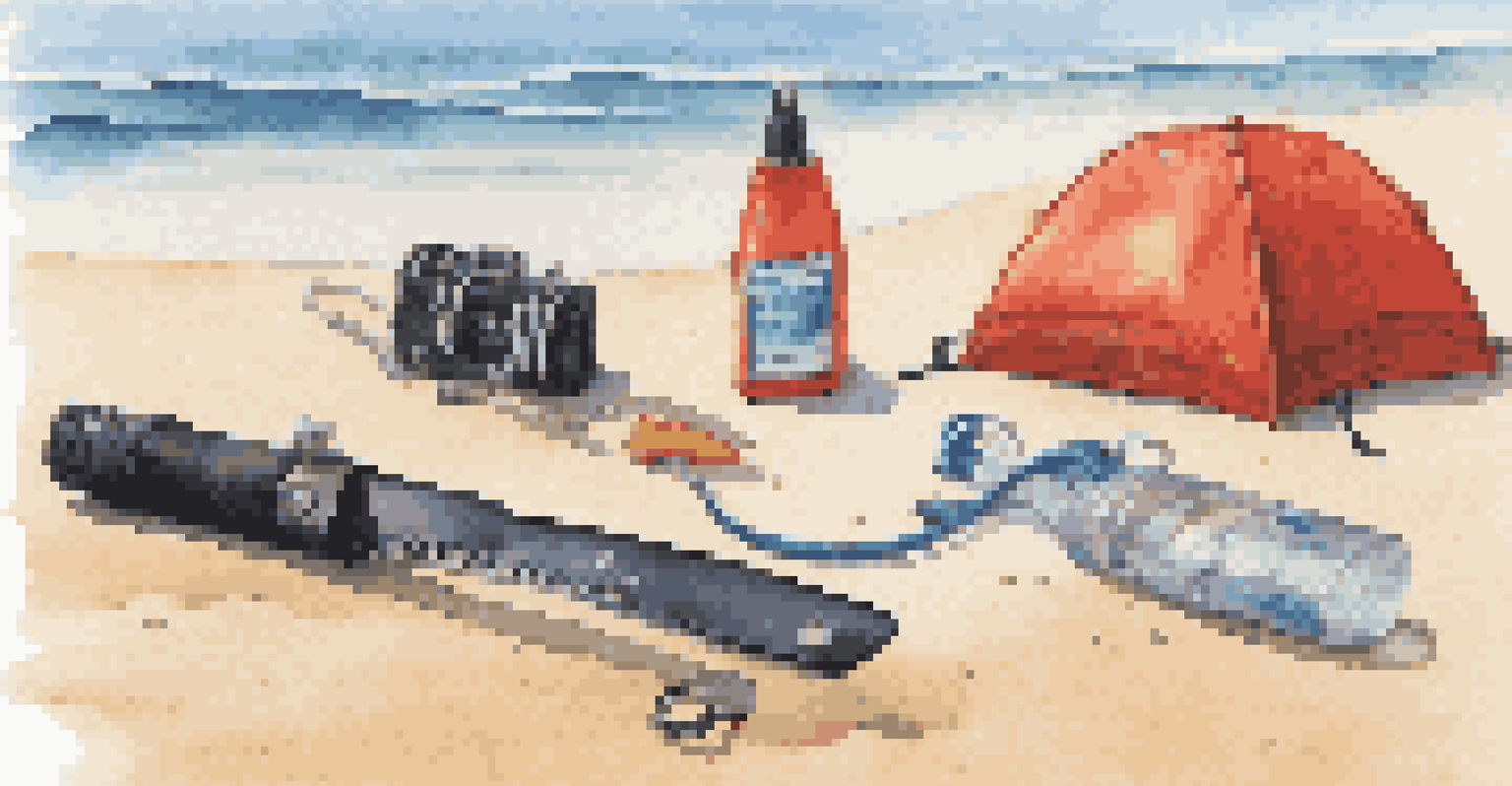How to Handle Diving Emergencies: A Diver's Guide

Recognizing Common Diving Emergencies
Diving emergencies can happen to even the most experienced divers. The first step in handling these situations is to recognize the signs early on. Common emergencies include equipment malfunctions, decompression sickness, and panic attacks.
In the midst of chaos, there is also opportunity.
For instance, if you notice your buddy struggling to breathe or showing signs of distress, it’s crucial to act quickly. Understanding the symptoms of each emergency can be key to staying calm and composed. Remember, awareness is your first line of defense.
By familiarizing yourself with these potential issues before diving, you’re better prepared to tackle them should they arise. This preparation can make all the difference in a high-pressure situation.
Emergency Equipment Every Diver Should Carry
Having the right emergency equipment can mean the difference between a close call and a serious incident. As a diver, it’s vital to carry essential gear such as a dive knife, surface signaling devices, and a spare air source. These tools can help you manage emergencies effectively.

For example, a dive knife can be invaluable if you or your buddy become entangled in underwater vegetation or debris. Similarly, a surface signaling device, like a whistle or a safety sausage, can alert boats above to your location in case of an emergency.
Recognize Diving Emergencies Early
Awareness of common diving emergencies like equipment malfunctions and panic attacks is crucial for maintaining safety underwater.
Always check your equipment before diving and ensure everything is functioning properly. Familiarity with your gear will boost your confidence and readiness when faced with unexpected situations.
The Importance of Buddy System in Emergencies
The buddy system is a fundamental safety principle in diving, and for good reason. Having a diving partner means you can look out for each other, especially in emergencies. If one diver encounters trouble, the buddy can assist or initiate rescue procedures.
The best way to predict the future is to create it.
Imagine you’re diving with a friend and they suddenly experience a panic attack. Your calm presence can help them regain control and find safety together. Even in simpler emergencies, like a minor equipment failure, having a buddy nearby can facilitate quicker problem-solving.
Always discuss emergency plans with your buddy before diving. This preparation not only strengthens your teamwork but also builds trust and confidence in each other’s abilities.
Basic First Aid Skills for Divers
Knowing basic first aid can be a lifesaver in diving emergencies. Familiarize yourself with techniques such as CPR, the recovery position, and how to treat decompression sickness. These skills empower you to take action while waiting for professional help.
For instance, if a diver surfaces with symptoms of decompression sickness, knowing how to provide first aid could significantly improve their chances of recovery. Understanding the fundamentals of first aid ensures you remain calm and capable in a crisis.
Essential Emergency Equipment
Carrying vital emergency gear, such as a dive knife and signaling devices, can significantly enhance your ability to respond effectively in crises.
Consider taking a first aid course specifically designed for divers. This training not only enhances your skills but also boosts your confidence when faced with emergencies.
Decompression Sickness: Prevention and Response
Decompression sickness, or 'the bends,' is a serious condition that arises when a diver ascends too quickly. To prevent this, always adhere to safe ascent rates and follow dive tables or computers. However, if symptoms do occur, knowing how to respond is crucial.
Symptoms may include joint pain, dizziness, or difficulty breathing. If you or your buddy experience these signs, it’s essential to seek immediate medical attention. Stay calm and communicate clearly with your dive team about what’s happening.
Understanding both prevention and response strategies will help you dive more safely. Always prioritize safety over adventure; the underwater world will still be there when you’re ready.
Handling Equipment Failures Underwater
Equipment failures can strike at the most inconvenient times, so knowing how to handle them is essential. First, regularly check and maintain your gear to reduce the likelihood of issues. If something goes wrong underwater, stay calm and assess the situation.
For example, if your regulator malfunctions, switch to your alternate air source and signal to your buddy. Practicing such scenarios during training dives can prepare you for the real thing, making it easier to react under pressure.
Importance of the Buddy System
Diving with a buddy not only provides immediate assistance during emergencies but also fosters trust and teamwork for better safety.
Remember, a well-prepared diver is less likely to panic. Familiarizing yourself with your equipment and practicing emergency drills improves your ability to manage unforeseen problems.
Emergency Ascents: When and How to Do It
Sometimes, an emergency ascent is unavoidable, but it should always be a last resort. If you find yourself in a situation where you must ascend quickly, remember to exhale continuously. This helps to prevent lung over-expansion injuries as you rise to the surface.
Make sure to maintain a controlled ascent speed, even if you’re in a hurry. The general rule is to ascend no faster than 30 feet per minute. If you have time, consider making a safety stop at 15 feet for about three minutes to allow excess nitrogen to dissipate.

Planning for potential emergency ascents during your dive briefings can help you stay calm if the need arises. Knowing the correct procedures will ensure you can respond effectively and safely.
Post-Dive Care: Assessing Your Well-Being
After every dive, it's important to assess your physical and mental well-being. Take a moment to evaluate how you feel and check for any signs of decompression sickness. Early detection can be crucial for a successful recovery.
Engage in open communication with your dive buddies about any issues or concerns you may have experienced during the dive. This collaborative approach fosters a safe diving community and encourages everyone to prioritize health.
Additionally, consider keeping a dive log that notes any unusual occurrences during your dives. Over time, this can help identify patterns and improve your diving practices. Remember, the goal is to enjoy diving while prioritizing safety.